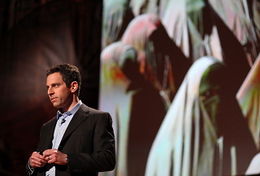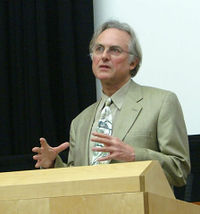Difference between revisions of "Stigma of atheism"
Wikignome72 (Talk | contribs) (→Stigma of atheism post Donald Trump's election) |
Wikignome72 (Talk | contribs) (→Stigma of atheism post Donald Trump's election) |
||
| Line 28: | Line 28: | ||
=== Stigma of atheism post Donald Trump's election === | === Stigma of atheism post Donald Trump's election === | ||
| + | |||
| + | ''See also:'' [[Donald Trump and American atheists]] | ||
The New Yorker wrote about the stigma of atheism post Donald Trump's election: "The most evident manifestation of this resurgence of Christian nationalism has been animosity toward Muslims..., but the group most literally excluded from any godly vision of America is, of course, atheists. Yet the national prejudice against them long predates [the 1950s]."<ref>[https://www.newyorker.com/magazine/2018/10/29/why-are-americans-still-uncomfortable-with-atheism Why Are Americans Still Uncomfortable with Atheism?] by By Casey Cep, The New Yorker</ref> | The New Yorker wrote about the stigma of atheism post Donald Trump's election: "The most evident manifestation of this resurgence of Christian nationalism has been animosity toward Muslims..., but the group most literally excluded from any godly vision of America is, of course, atheists. Yet the national prejudice against them long predates [the 1950s]."<ref>[https://www.newyorker.com/magazine/2018/10/29/why-are-americans-still-uncomfortable-with-atheism Why Are Americans Still Uncomfortable with Atheism?] by By Casey Cep, The New Yorker</ref> | ||
Revision as of 13:36, October 15, 2019

Concerning the stigma of atheism, sociological research indicates that atheists are widely distrusted in both religious cultures and nonreligious cultures (see: Distrust of atheists and Views on atheists).[3][4][5][6] According to a study published in the International Journal for The Psychology of Religion: "anti-atheist prejudice is not confined either to dominantly religious countries or to religious individuals, but rather appears to be a robust judgment about atheists."[5] The study found that many atheists do not trust other atheists as well.[5]
The abstract for the 2016 journal article entitled Atheism and how it is perceived: Manipulation of, bias against and ways to reduce the bias which was published in the journal Nordic Psychology indicates: "...atheists are distrusted, elicit disgust and are viewed as immoral both explicitly and implicitly".[7][8]
The abstract of a 2014 peer-reviewed study entitled Everything Is Permitted? People Intuitively Judge Immorality as Representative of Atheists which was published in the journal Plos One reported:
| “ | American participants intuitively judged a wide variety of immoral acts (e.g., serial murder, consensual incest, necrobestiality, cannibalism) as representative of atheists, but not of eleven other religious, ethnic, and cultural groups. Even atheist participants judged immoral acts as more representative of atheists than of other groups. These findings demonstrate a prevalent intuition that belief in God serves a necessary function in inhibiting immoral conduct, and may help explain persistent negative perceptions of atheists.[9] | ” |

Citing a study, which was published in the science journal Nature, on the public's perception of atheists the Smithsonian declares:
| “ | “It is striking that even atheists appear to hold the same intuitive anti-atheist bias,” study co-author Will Gervais, psychology professor at the University of Kentucky, tells AFP. “I suspect that this stems from the prevalence of deeply entrenched pro-religious norms. Even in places that are currently quite overtly secular, people still seem to intuitively hold on to the belief that religion is a moral safeguard.”[12] | ” |
The new atheist Sam Harris said concerning the label of atheist, "It's right next to child molester as a designation."[1][2]
The BBC declared in 2014: "A recent poll conducted by the Pew Research Centre shows Americans would rather have a president who was either in their 70s, or openly gay, or who had never held any public office than one that was atheist." (See: Atheism and politics).[13]
Atheism is often associated with various types of immorality (see: Atheism and morality). In addition, historically atheists have frequently behaved in an immoral manner (see: Atheist population and immorality) and various atheists have committed capital crimes (see: Atheism and Mass Murder and List of atheist shooters and serial killers).
Contents
Stigma of atheism in the United States
See also: Sociology of "atheism is un-American" view and American atheism

The abstract for the 2011 journal article An atheistic American is a contradiction in terms”: Religion, Civic Belonging and Collective Identity in the United States published in the European Journal of American Studies indicates:
| “ | Through the analysis of the status and perception of atheists in American history, from the colonial times to the beginning of the 21st century, this article explores the importance of religion in the structuring of Americans’ national and civic imaginaries. Starting from the assumption that atheists have always tended to be a distrusted minority in the United States, this essay seeks more precisely to explain how and why not to believe in God came to be regarded through the centuries not only as a moral and social deviance, but also as essentially “un-American” behavior. It further demonstrates that the historical “otherness” of the atheist tends to indicate that religion has functioned as one of the “moral boundaries” of a certain American “imagined community”, perceived as an essential warranty of both individual virtue and “good citizenship” and as a basic attribute of the American “self”.[14] | ” |
The 2013 Freedom of Thought report published the International Humanist and Ethical Union indicates: "...the U.S. has long been home to a social and political atmosphere in which atheists and the non-religious are made to feel like lesser Americans or non-Americans."[15] See also: American atheism
Stigma of atheism post Donald Trump's election
See also: Donald Trump and American atheists
The New Yorker wrote about the stigma of atheism post Donald Trump's election: "The most evident manifestation of this resurgence of Christian nationalism has been animosity toward Muslims..., but the group most literally excluded from any godly vision of America is, of course, atheists. Yet the national prejudice against them long predates [the 1950s]."[16]
Stigma of atheism in Islamic countries
See also: Atheism vs. Islam
In Islamic countries, atheism is commonly held in very low regard. For example, when Palestinians were asked in man on the street interviews their opinions on atheists/atheism, they commonly expressed negative attitudes concerning a person choosing to be an atheist.[17]
In several Islamic countries or where Islam has significant influence, atheism is punishable by the death penalty (see: Atheism vs. Islam).
In 2016, Siobhan Fenton wrote in the Independent:
| “ | In thirteen countries, you can be sentenced to death for not having a faith:
1. Afghanistan 2. Iran 3. Malaysia 4. Maldives 5. Mauritania 6. Nigeria 7. Pakistan 8. Qatar 9. Saudi Arabia 10. Somalia 11. Sudan 12. United Arab Emirates 13. Yemen[18] |
” |
Unnattractiveness of atheism
See also: Unattractiveness of atheism
The American Christian Todd Strandberg said of atheism: "The ranks of atheists have always been small... The key problem with atheism is that it lacks a strong 'selling point'".[19] (See also: Atheism and apathy)
Throughout mankind's history, most people have found atheism to be uninteresting and ungratifying (See: Atheism and inspiration).
See also
- Atheism and social outcasts
- Closet atheist
- Atheism and loneliness
- Desecularization and social conformity
- Atheist stereotypes
- Militant atheism
Notes
- ↑ 1.0 1.1 NEWSWEEK Poll: 90% Believe in God, Newsweek 2007
- ↑ 2.0 2.1 Roberts, Jessica, et al. (June 19, 2007). "Interview with an atheist". News21. Retrieved on July 30, 2014.
- ↑ Study: Atheists distrusted as much as rapists
- ↑ Atheists Widely Distrusted, Even Among Themselves, UK Study Finds, Christian Post, 2015
- ↑ 5.0 5.1 5.2 Anti-atheist distrust ‘deeply and culturally ingrained’, study finds, The Independent, 2015
- ↑ Edgell, Gerteis & Hartmann 2006
- ↑ Atheism and how it is perceived: Manipulation of, bias against and ways to reduce the bias by Gerhard Andersson, Nordic Psychology 68(3):1-10 · January 2016, DOI: 10.1080/19012276.2015.1125304 (source: researchgate.com)
- ↑ Atheism and how it is perceived: Manipulation of, bias against and ways to reduce the bias by Gerhard Andersson, Nordic Psychology 68(3):1-10 · January 2016, DOI: 10.1080/19012276.2015.1125304 (source: Taylor and Francis group at www.tandfonline.com)
- ↑ Everything Is Permitted? People Intuitively Judge Immorality as Representative of Atheists
- ↑ Dawkins: Mock them. Ridicule them! In public
- ↑ Dawkins: Mock them. Ridicule them! In public
- ↑ Survey Finds Most People Are Biased Against Atheists, Including Atheists By Jason Daley, AUGUST 9, 2017, smithsonian.com
- ↑ The stigma of being an atheist in the US By Aleem Maqbool, 2014, BBC
- ↑ An atheistic American is a contradiction in terms”: Religion, Civic Belonging and Collective Identity in the United States by Amandine Barb, European Journal of American Studies , Spring 2011
- ↑ 2013 Freedom of Thought by International Humanist and Ethical Union
- ↑ Why Are Americans Still Uncomfortable with Atheism? by By Casey Cep, The New Yorker
- ↑ Palestinians: What do you think of atheists?
- ↑ The 13 countries where being an atheist is punishable by death by Siobhan Fenton, Indepednent
- ↑ Atheism: The cult of death
